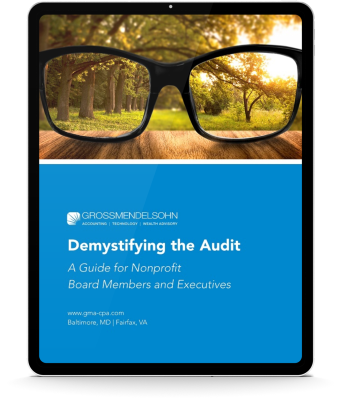Do you know what you’re signing up for if someone asks you to be on the audit committee of a nonprofit organization?
The answer to this varies from organization to organization. Some organizations lay out a very detailed list of responsibilities for their audit committees while others have a very broad range of responsibilities that sometimes blend with that of the finance committee.
In most cases the audit committee (and even the full board) should be operating at a macro level. That's not to say they shouldn’t dig into details. Rather, they should generally not get involved in the details to such a degree that they are micro managing. The key is to think “big picture.”
1. Oversee the Selection and Performance of the Outside Audit Firm
One responsibility of the audit committee is to oversee the selection and performance of the outside audit firm.
Even though auditor rotation is not required for nonprofits, audit committees should evaluate the performance of the outside auditor, the efficiency of your audit and the fees charged to make sure the organization is getting the best return on the money it’s spending.
The bid process is usually not done more often than every five years. When you do go through a bid process, the audit committee should weigh credentials, comments from client references and other qualitative factors, as well as the fees, of the CPA firms that submit proposals.
2. Monitor the Process of the Annual Audit
Another responsibility of the audit committee is to monitor the process of the annual independent audit.
There is no way to completely eliminate all financial risk, but proper oversight is a key compensation control that external auditors look for in a good system of internal controls.
The audit committee should be informed of the audit timetable and receive periodic updates on the progress of the audit and any issues that are developing.
When the final audit is complete the audit committee generally reviews the deliverables, which are the financial statements, the board governance letter and the management letter. They work with day-to-day management to correct any weaknesses or recommend that certain risks were mitigated to an acceptable level. In the case of larger organizations, the audit committee might also monitor the activities and results of audits performed by internal auditors.
When an organization receives federal funding, either directly or through pass-through entities, monitoring of reports regarding federal financial assistance by the audit committee can extend to the programs even if there is not a formal internal audit process.
3. Be a Link Between Employees, Stakeholders, Nonprofit Management and the Full Board
A good audit committee functions as an independent link in the chain of management to the full board.
For instance, if there was a questionable situation in an organization, some people might not be comfortable going to day-to-day management or even the C-level executives in the nonprofit. In this case the audit committee can fill the vital role of listening to the concerns of employees or other stakeholders.
Being independent, audit committee members can provide a certain distance to make the situation more anonymous while they investigate the concern to see if it’s valid or if there was just a misunderstanding. Many organizations set up direct reporting processes to the audit committee. Sometimes this is done internally and other times they use an outside reporting service, such as an employee hotline.
Need Help?
This is a brief summary of the roles and responsibilities of audit committee members. The duties need to be tailored for each organization, with the ultimate goal of minimizing risk of financial loss and reporting errors by the organization.
For help with your organization's audit, contact us online or call 800.899.4623.


